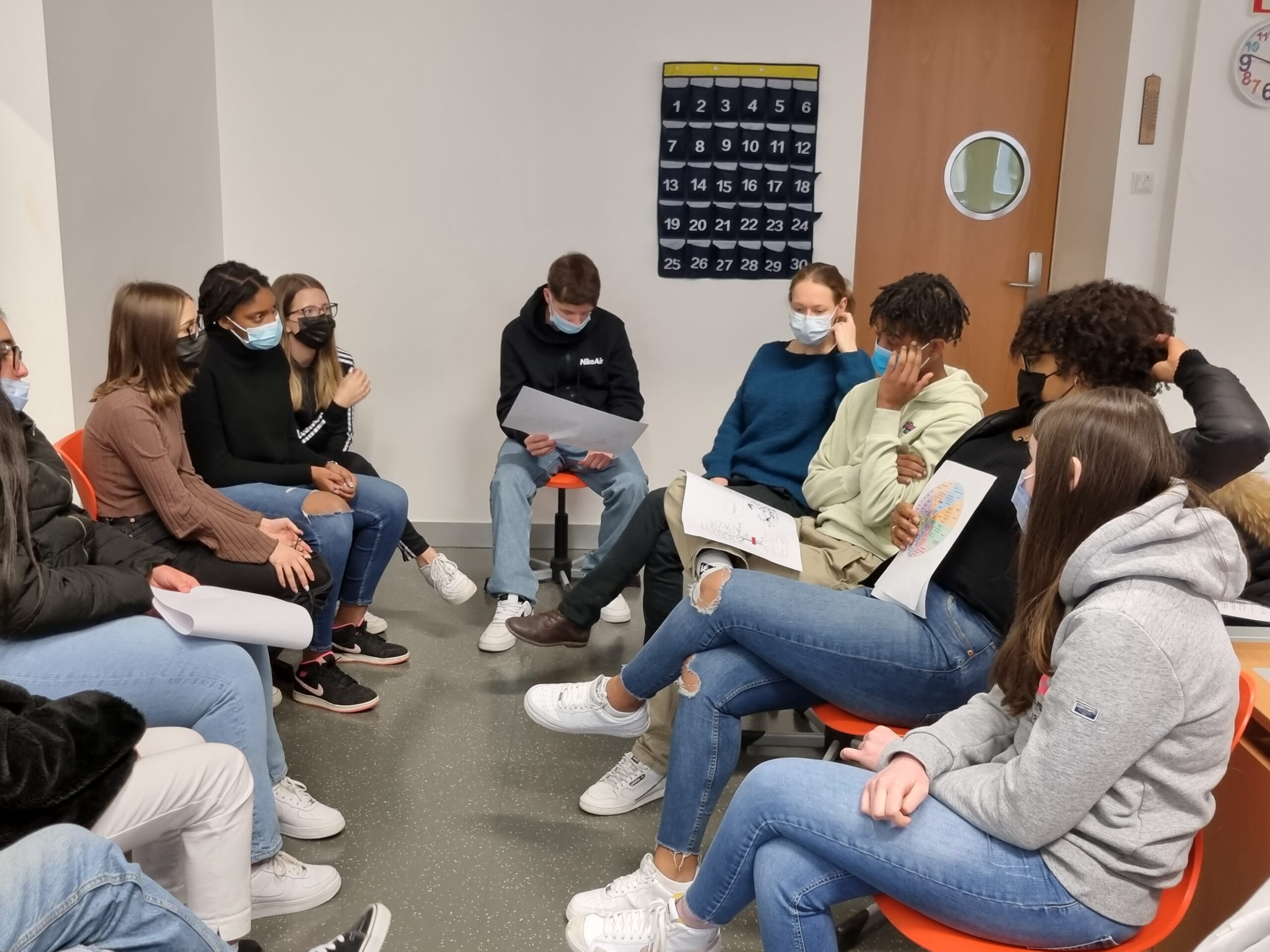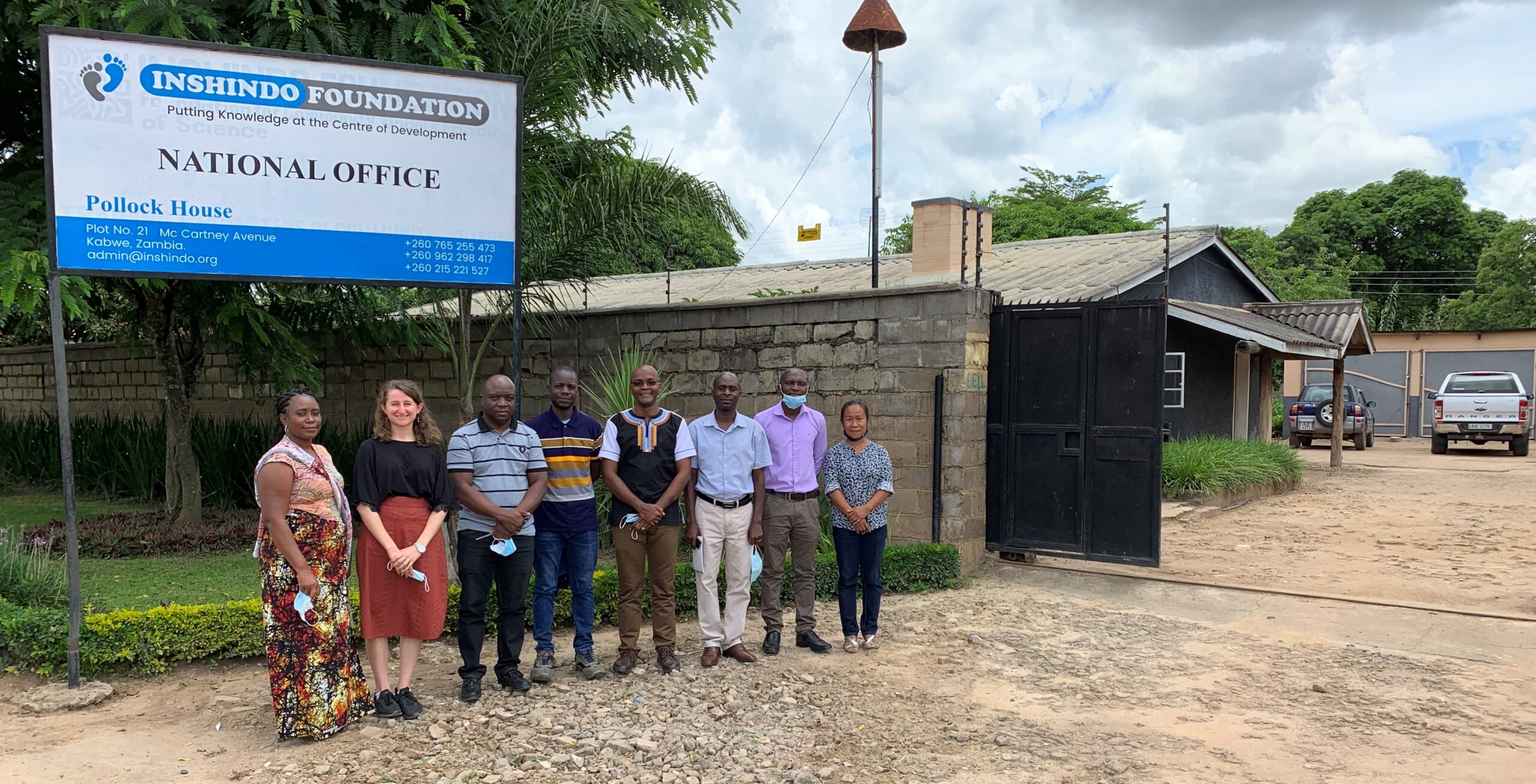
At UF, the 2022 year in awareness kicks off at Fieldgen High School!
12/02/2022
A volunteer tells you about her experience leading a workshop at Sainte Anne’s private school!
22/02/2022An unforgettable visit to our partner in Zambia
As part of Unity Foundation’s visits to its local partners, Unity Foundation team member Luna Congo traveled to Zambia to visit Inshindo Foundation between Monday, January 24 and Friday, January 28, 2022.
Visits to community schools, Preparation for Social Action (PSA) groups, plots and agricultural centers; meetings with participants, tutors and coordinators, parents’ committees and traditional chiefs: a rich and intense program awaited her during these few days spent in Kabwe (Central province) and Mwinilunga (North-Western province). Here is her account of some of the highlights of the visit.
Community schools and parents’ committees
The first day began with a visit to Gems Community School in Chisamba. Established in 2013, it now offers education up to grade 11 to about 140 children. Parents hope that the school will be able to offer grade 12 starting next year. I was able to have a conversation with teachers and members of the school’s parent committee. They talked about the financial support that parents provide to teachers and how they come together to consult on the needs of the school and to find solutions to challenges that arise. For example, a poultry house is currently being built to help pay the teachers by selling eggs, and the school has an agricultural production unit to support the school and teachers. The committee members present also shared the positive impact that the moral education provided by the school has, leading children and youth to engage in various acts of service in the community.

Teachers and students from Gems Community School; meeting with the school’s parent committee.
Minestone Community School, located in Mwinilunga, is relatively new; it was established in 2020. While the students were engaged in activities with their teachers, I was able to converse with members of the parent-teacher association, which is comprised of 20 people. The school currently has two preschool classes with a total of 42 children divided by age. It was created by participants in the PSA program as a result of the practice of their study on early childhood education. The parents were very enthusiastic and encouraged them to continue their efforts, as the children have to walk a long distance to get to the nearest school. Two participants in the PSA program therefore attended teacher training to build their capacity and formalize the establishment of the school. Since its inception, 14 children have graduated and entered primary school and parents have received very good feedback on their performance from their new school. One of the current concerns of the association is to obtain a structure for the school, which currently operates in a church, and to create latrines for the school. In addition, the parents would like the school to offer at least until grade 7, adding one grade each year.

Visit to Minestone Community School.
Meeting with regional and national coordinators
I also had the chance to visit Inshindo’s national office, which includes the Central Province regional team office, and to have a meeting with the four national coordinators and three regional coordinators from that province. Each of the program coordinators presented the recent progress in their area of work and issues that are the subject of a learning process to increase the effectiveness and impact of their efforts.
Members of the organization also shared about their growing collaboration with government departments of education and agriculture, health centers, civil society organizations and traditional chiefs. These different actors no longer simply give the NGO permission to carry out its activities; they actually recognize and appreciate the work Inshindo is doing. For example, the organization is invited to different spaces at the district level to share its experiences in polyculture. The authorities appreciate the fact that some crops that they thought could not be grown in the area can in fact be planted.

Meeting with Inshindo Foundation regional and national coordinators at the national office.
Centers for Community Agriculture and Plots
We then visited the Ngungu Center for Community Agriculture, which was built on land deeded to Inshindo by the Ministry of Sports and Community Development in Kabwe. Inaugurated in 2019, it hosts tutor meetings, farmers’ seminars held every three months, community gatherings and PSA study sessions, and features a library, seed bank, laboratory, and a diversified high-efficiency (DHE) demonstration plot, where the organization and tutors can gain experience. As one coordinator explained, “it is through the interaction between modern science and traditional knowledge that appropriate technology can emerge”, and the farmers’ seminars create the space where this interaction is possible.

Visiting the Ngungu Center for Community Agriculture.
Here, as in North Western Province, I was able to see agricultural plots where various fruits and vegetables are grown, allowing for better pest and disease management, and I was able to witness the final stages of compost preparation.

Bananas and pineapples grown on agricultural plots and preparation of compost.
Testimonials from program participants
We also visited several PSA groups in Kabwe and Mwinilunga. Several participants, tutors and coordinators spoke to share the benefits they have gained from participating in the PSA program and the improvements that have resulted in their communities. Here are some of their stories:
“Since we have been participating in the program and studying about the nature of the interactions that there should be in the community, we have been able to develop the qualities of truthfulness, generosity. Now we are leaders of those qualities. We are very grateful to the program because it developed qualities in us that we didn’t have.”“Now, interacting with the community is no longer a challenge. It has become easy for me to organize and engage people.” (From a tutor)
“I learned about malaria. I didn’t know it came from mosquitoes. Many people in the community think malaria comes from eating pumpkin leaves. Now I can share this knowledge with the community.”
“We held a malaria awareness meeting with mothers, during which we presented the life cycle of a mosquito and the importance of protecting young children especially.”
“At first I didn’t know anything and was afraid to read when the tutor asked. Now I read very well, and I volunteered to be a teacher and started a community school. I also learned how to use a computer.”
“Before, I didn’t know how to gather children and teach them things. Now I teach 48 children.”
“Through the study of the text Addition and Subtraction, I was able to develop the ability to manage profit and loss and thus open my own business.”
“We set up a savings group. Because of this, I was able to send my children to school, buy uniforms, put money aside to build my house, and buy goats and ducks.”
“It’s a very good program. Before, we didn’t know the importance of the environment. We used to cut trees, kill animals and insects for no reason. Now we don’t do that anymore.”
“Widespread agricultural practices here, such as cutting trees, contribute to infertile soils. We have improved the quality of the soil by using animal manure, compost and certain plants.”
“Because of the use of local seeds, we do not have problems with pests and diseases in our crops. We are restoring some of the crops that our forefathers used to plant. We are making sure we have our own seeds so we don’t depend on the certified seeds provided by the government, which require the use of chemicals and pesticides.”

Meetings with participants, tutors and coordinators of the PSA program.
Visits to traditional chiefs
The visit concluded with two courtesy visits to traditional chiefs in charge of different parts of Mwinilunga district. Both expressed their joy at receiving us and their deep appreciation and encouragement for the work of Inshindo Foundation. In particular, Senior Chief Kanongesha testified to the decrease in gender-based violence and AIDS cases in his chiefdom thanks to Inshindo’s efforts. He emphasized the importance of working for the advancement of women, strengthening agriculture in the region, and raising awareness about climate change and the impact of local actions on all humanity (“A tree here is not a Zambian tree, it is a global tree!”). The members of Inshindo present assured him that these themes are at the heart of the organization’s work. To thank us for our visit, he generously offered us a chicken and a wheelbarrow full of pineapples!

Visit of the Senior Chief Kanongesha.
In conclusion, this short but intense visit was very rich and allowed us to strengthen the bonds of friendship and mutual understanding between Unity Foundation and Inshindo Foundation. The maturity of the organization, the recognition it enjoys in the regions where it operates and the effects of the programs it implements, both on the individuals who take part in them and on their communities, were visible throughout the visit. We look forward to continuing our collaboration with Inshindo throughout the 2022-2026 framework agreement, which will undoubtedly be a source of much learning for both our organizations!



